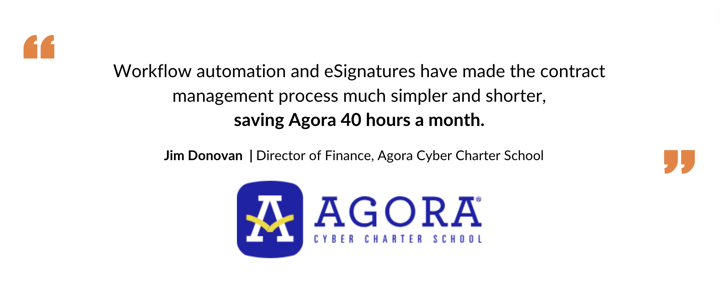

A study by AIIM (Association for Intelligent Information Management) found that 64% of regulated businesses prioritise contract management automation.
This underscores a broader industry shift away from traditional headcount expansion toward smarter, more scalable processes. Faced with economic constraints and the mandate to "do more with less," businesses are turning to automation to unlock efficiency, eliminate manual effort, and maintain compliance without increasing team size.
Contract automation is the use of AI and dedicated contract lifecycle management software to streamline contract management tasks, reduce manual processes, and enhance compliance across your business - without expanding your team.
By automating previously manual and error-prone tasks, businesses can maintain output and quality without the need to hire additional headcount.
Automation enables leaner teams to operate more effectively by eliminating efficiencies, reducing compliance risks, and significantly improving contract visibility and control.
.png?width=936&height=552&name=_-%20visual%20selection%20(4).png)
Your team is likely spending hours each week buried under repetitive administrative tasks like manual data entry, chasing approvals, and tracking down documents - effort that becomes unsustainable as contract volumes grow but headcount remains flat.
Contract automation tackles these mundane tasks head-on, streamlining and automating workflows so your lean team can redirect its limited time and capacity to higher-value work, such as:
By removing the manual overhead, contract automation empowers your teams to focus on initiatives that directly impact business outcomes, drive cost savings, and strengthen vendor relationships.
Compliance failures can trigger audits, fines, and long-term reputational damage. Manual tracking methods leave too much room for error.
With automated alerts and w, your teams no longer need to rely on memory, inbox reminders, or outdated spreadsheets to stay on top of regulatory deadlines and contractual obligations.
Instead, they gain a reliable system that flags upcoming milestones, renewal windows, and compliance checkpoints in advance.
Manual handling of contract data is inherently error-prone from missed clauses and mis-keyed dates to overlooked obligations.
These can lead to compliance breaches, financial penalties, or strained vendor relationships. These small mistakes often snowball into costly rework, lost time, and damaged trust.
AI-driven contract data extraction eliminates these risks by automatically identifying and accurately recording key terms, conditions, and deadlines.
By removing the manual element, you:
Disjointed contract processes often lead to duplicated work, bottlenecks, and misaligned priorities across Legal, Procurement, and Finance.
Contract automation solves this by unifying teams around structured, automated workflows, with clearly defined roles, responsibilities, and approval stages.
Instead of chasing email threads or waiting on manual handoffs, stakeholders can work in parallel, receive automated prompts when input is needed, and track progress in real-time from a centralised workspace.
Manual contract reviews slow down approvals, delay spend, and reduce visibility across the business.
Contract automation tools speed up the process by using AI to automatically review agreements, extract key terms, and flag deviations from standard clauses, allowing Legal and Finance to focus only on what needs attention.
Parallel workflows, built-in approvals, and real-time updates reduce bottlenecks and unlock faster, more informed decisions.
With earlier access to risk insights and clearer oversight of commercial obligations, contract automation tools help the Office of the CFO drive agility without compromising on compliance or control.
When evaluating contract automation solutions, ensure the software you choose clearly addresses your team's everyday challenges and supports your business objectives.
Prioritising these essential, benefit-led features will empower your teams, streamline processes, and significantly reduce common contract management pain points.
Automated contract management is particularly essential in highly regulated sectors such as Financial Services, Healthcare, and Biotech, where compliance and risk management are paramount.
Agora Cyber Charter School, a leading virtual education provider based in Pennsylvania, was managing between 50–100 service provider contracts at any given time - each with complex pricing and service agreements. This entire workload fell to a single individual who was burdened by a 14-step, email-driven process that relied heavily on manual intervention.
Contracts were stored in physical filing cabinets and distributed via endless email threads, leading to inefficiencies, version control issues, and compliance risks.

With Gatekeeper:
By shifting from manual to automated contract management, Agora gained greater visibility, reduced administrative burden, and enhanced accountability across departments.
If you're ready to automate your processes, book your demo today.
Contract automation is the use of software to manage and streamline contract-related tasks, such as creation, review, approval, and storage. It reduces manual effort, increases accuracy, and ensures compliance across the contract lifecycle.
Contract automation works by digitising key stages of the contract lifecycle. This includes using templates, automated workflows, AI-powered data extraction, centralised storage, and eSignatures to manage contracts from creation through renewal.
Artificial intelligence enhances contract automation by:
Ready to improve your contract & vendor management?
.png)
.png)
.png)
-4.png)
Before Gatekeeper, our contracts
Anastasiia Sergeeva, Legal Operations Manager, BlaBlaCar
were everywhere and nowhere.
Gatekeeper is that friendly tap on the shoulder,
Donna Roccoforte, Paralegal, Hakkasan Group
to remind me what needs our attention.
Great System. Vetted over 25 other systems
Randall S. Wood, Associate Corporate Counsel, Cricut
and Gatekeeper rose to the top.
Thank you for requesting your demo.
Next Step - Book a Call
Please book a convenient time for a quick call to discuss your requirements.